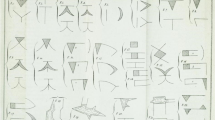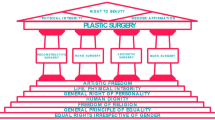Abstract
Plastic, reconstructive, and cosmetic surgery refers to a variety of operations performed in order to repair or restore body parts to look normal or to enhance a certain structure or anatomy that is already normal. Several ethical considerations such as a patient’s right for autonomy, informed consent, beneficence, and nonmalfeasance need to be given careful consideration. The principal objective of the medical profession is to render services to humanity with full respect for human dignity. Plastic surgeons should merit the confidence of patients entrusted to their care, rendering to each a full measure of service and devotion. They require an extensive amount of education and training. The increases in demand for aesthetic plastic surgery and the advocacy of practice in the media have raised concerns about the circumstances under which cosmetic surgery is ethical and permissible. Innovative research, and new technologies derived from such research, almost always raises ethical and policy concerns. Medical ethics regulate what is, and what is not, correct in promoting plastic surgery to the public. It is essential to create an educated and informed public about the ethical issues in the plastic and reconstructive surgery field. Plastic surgeons need to carefully evaluate the degree of deformity, physical and emotional maturity, and desired outcome of patients who request plastic surgery procedures. Science is a powerful force for change in modern society and plastic surgeons have a responsibility to shepherd that change with thoughtful advocacy and careful ethical scrutiny of their own behavior.
Similar content being viewed by others
References
Beauchamp T, Childress J (2001) Principles of biomedical ethics. Oxford University Press, New York
Miles SH (2003) The Hippocratic Oath and the ethics of medicine. WB Saunders, Philadelphia
Gregory J, Percival T, Rush B (1997) Medicine and morals in the enlightenment. Rodopi Bv Editions, Atlanta
Berlant J (1975) Profession and monopoly: a study of medicine in the United States and Great Britain. University of California Press, Berkeley
Fletcher J (1966) Situation ethics. SCM Press, London
De Sousa A (2007) Concerns about cosmetic surgery. Indian J Med Ethics 4(4):171–173
Sullivan DA (2001) Cosmetic surgery: the cutting edge of commercial medicine in America. Rutgers University Press, New Brunswick
Haddad AM (1987) Using principles of beneficence, autonomy to resolve ethical dilemmas in perioperative nursing. AORN J 46(1):120, 122, 124
Sarwer DB, Crerand CE (2004) Body image and cosmetic medical treatments. Body Image 1(1):99–111
Chavoin JP (2003) Aesthetic surgery and ethics. Ann Chir Plast Esthet 48(5):273–278
Singer PA, Viens AM (2008) Cambridge textbook of bioethics. Cambridge University Press, Cambridge
Pitanguy I (2007) Plastic surgery: personal recollections, contributions, and some thoughts. The Ohmori lecture: 18th I.S.A.P.S. Congress, Rio De Janeiro—2006. Aesthetic Plast Surg 31(6):619–635
Goldwyn RM (1988) Unproven treatment: whose benefit, whose responsibility? Plast Reconstr Surg 81:946–947
Honigman RJ, Phillips KA, Castle DJ (2004) A review of psychosocial outcomes for patients seeking cosmetic surgery. Plast Reconstr Surg 113(4):1229–1237 (review)
Sterodimas A, Radwanski HN, Pitanguy I (2009) Aesthetic plastic surgery: junior plastic surgeons’ confidence in a training program. Aesthetic Plast Surg 33(1):131–132
Klingensmith ME (2008) Teaching ethics in surgical training programs using a case-based format. J Surg Educ 65(2):126–128
Ward CM (1998) Consenting and consulting for cosmetic surgery. Br J Plast Surg 51:547–550
Spilson SV, Chung KC, Greenfield ML, Walters M (2002) Are plastic surgery advertisements conforming to the ethical codes of the American society of plastic surgeons? Plast Reconstr Surg 109:1181–1186
Rohrich RJ (2001) The market of plastic surgery: cosmetic surgery for sale—at what price? Plast Reconstr Surg 107:1845–1847
Sarwer DB, Grossbart TA, Didie ER (2003) Beauty and society. Semin Cutan Med Surg 22(2):79–92
Pearl A, Weston J (2003) Attitudes of adolescents about cosmetic surgery. Ann Plast Surg 50:628–630
Walgenbach KJ, Voigt M, Riabikhin AW, Andree C, Schaefer DJ, Galla TJ, Björn G (2001) Tissue engineering in plastic reconstructive surgery. Anat Rec 263(4):372–378
Sterodimas A, De Faria J, Correa WE, Pitanguy I (2009) Tissue engineering in plastic surgery: an up-to-date review of the current literature. Ann Plast Surg 62(1):97–103 (review)
Outka G (2009) The ethics of embryonic stem cell research and the principle of “nothing is lost”. Yale J Health Policy Law Ethics 9(Suppl):585–602
Sterodimas A, de Faria J, Nicaretta B, Pitanguy I (2010) Tissue engineering with adipose-derived stem cells (ADSCs): current and future applications. J Plast Reconstr Aesthet Surg 63(11):1886–1892
Zbar RI, Taylor LD, Canady JW (2008) Ethical issues for the plastic surgeon in a tumultuous health care system: dissecting the anatomy of a decision. Plast Reconstr Surg 122(4):1245–1252
Sterodimas A, Boriani F, Bogetti P, Radwanski HN, Bruschi S, Pitanguy I (2010) Junior plastic surgeon’s confidence in aesthetic surgery practice: a comparison of two didactic systems. J Plast Reconstr Aesthet Surg 63(8):1335–1337
Murray JE (1978) On ethics and the training of the plastic surgeon. Plast Reconstr Surg 61:270–271
May JW Jr (1991) The honor and responsibility of teaching in plastic surgery. Plast Reconstr Surg 88:869–873
Ward CM (1994) On learning medical ethics. Br J Plast Surg 47:507–511
Disclosure
The authors have no conflicts of interest or financial ties to disclose.
Author information
Authors and Affiliations
Corresponding author
Rights and permissions
About this article
Cite this article
Sterodimas, A., Radwanski, H.N. & Pitanguy, I. Ethical Issues in Plastic and Reconstructive Surgery. Aesth Plast Surg 35, 262–267 (2011). https://doi.org/10.1007/s00266-011-9674-3
Received:
Accepted:
Published:
Issue Date:
DOI: https://doi.org/10.1007/s00266-011-9674-3




